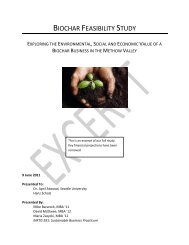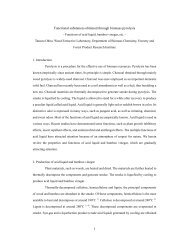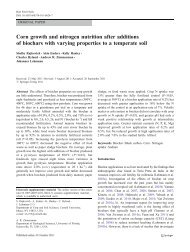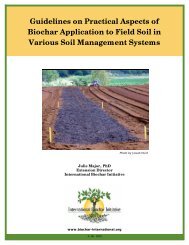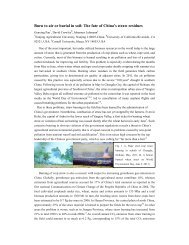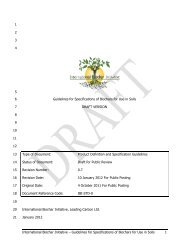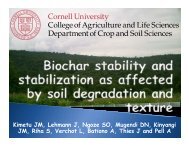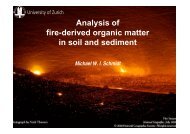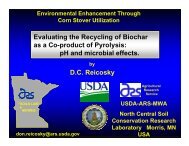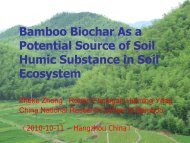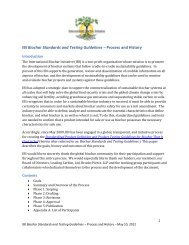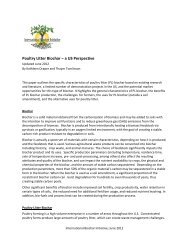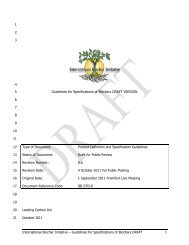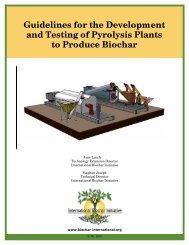November 2012 - International Biochar Initiative
November 2012 - International Biochar Initiative
November 2012 - International Biochar Initiative
Create successful ePaper yourself
Turn your PDF publications into a flip-book with our unique Google optimized e-Paper software.
lohsk@mpob.gov.my<br />
Figure 2 Rainshelter with automatic irrigation system with drips for 200 plants.<br />
Philippine <strong>Biochar</strong> Association<br />
The <strong>Biochar</strong> Road show, a project being implemented by the Development Society of the Ateneo<br />
de Manila University, is an awareness campaign that targets the educated youth from the top<br />
universities in the Philippines. With the establishment of the Philippine <strong>Biochar</strong> Association in<br />
2010, biochar technology has been introduced to the agricultural practices of the country. The<br />
<strong>Biochar</strong> Road Show highlights the great benefits of using biochar in agricultural practices to the<br />
environment while promoting the Philippine <strong>Biochar</strong> Association’s work with local farmers and<br />
government units. The <strong>Biochar</strong> Road show will be setting up their displays inside the top<br />
universities of the Philippines to raise awareness and spark interest among student bodies of<br />
Ateneo de Manila University, De LaSalle University, University of Santo Tomas, and University of<br />
the Philippines Diliman. The event will run from <strong>November</strong> <strong>2012</strong> to February 2013. Although the<br />
idea of environmental awareness has been around for a long time, this event is different in the<br />
way it highlights the issues of carbon emissions and greenhouse gases and showcases solutions.<br />
The road show takes into account what students already know about the problem, and provides<br />
outreach on innovative solutions such as presenting biochar as a new innovation that can help<br />
reduce carbon emissions while being able to help fellow Filipinos with agricultural lifestyles. The<br />
Philippines is naturally an agricultural country, making it easier for university students to see the<br />
great deal of change they would be able to make by supporting biochar and the efforts of the<br />
Philippines <strong>Biochar</strong> Association. These students will one day be the future of the country, and<br />
even just a handful of them can make a great impact on the country’s environmental future.<br />
The Saudi <strong>Biochar</strong> Research Group (SBRG)<br />
After the first successful application for NPST (The National Plan for Science and Technology)<br />
research scheme program, SBRG got a second funded research project titled ’’<strong>Biochar</strong> and<br />
activated carbon as a means for reducing levels of pesticide residues in contaminated soils to<br />
preserve water and plant resources’’. The newly accepted research is expected to start in<br />
February <strong>2012</strong>. In this new project biochar will be examined as a potential substrate for soil<br />
remediation from pesticides residue. The study will focus on the effect of biochar and activated<br />
carbon on pesticides residue transportation and transformations in soil solution system. The<br />
research group started a partnership with Prof. Dr Gerard Cornelissen from the Norwegian<br />
Geotechnical Institute (NGI) to act as project consultant.<br />
Additionally, there are some diverse ongoing interdisciplinary research activities related to biochar<br />
research taking place in the soil science department at King Saud University. An experiment to<br />
start this season will study the effect of biochar on soil nitrogen forms and transportation as well<br />
as the effect of biochar on GHG emissions from cultivated soils. The soil physics group is



